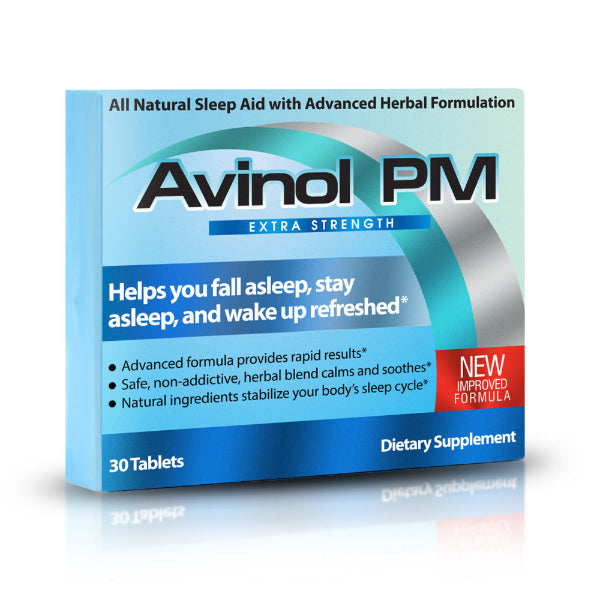The Secret Dangers of Over the Counter Sleep Medications
Table of Contents
Millions of people all over the modern world have taken an over the counter (OTC) sleep medication at one time or another. Odds are that if you're reading this, you've either taken them in the past or you're taking them now. But most people aren't aware of the frightening secrets that most sleeping pill manufacturers are keeping from consumers like you. After you're done reading this article, you may never want to take a conventional drug store sleeping pill again!
Their Biggest Secret: the Active Ingredient
Did you know that every single pill at the drugstore which claims to help you fall asleep contains the same active ingredient? If you don't believe us, take a close look at the product labels in the sleeping pill aisle next time you're in your local drug store. Flip the box of pills over to the back and look for this ingredient: diphenhydramine.
Diphenhydramine also serves another purpose: it's the main ingredient in antihistamine drugs like Benadryl. Its primary mechanism of action blocks the way histamine works in the body, effectively neutralizing any symptoms of mild allergic reactions to pollen, dust, animals, or contact dermatitis. But, somewhere along the way, people realized this ingredient also caused significant drowsiness. This inspired some drug companies to re-package the same ingredient and market it as a sleeping pill instead of an allergy medication.
This begs our next question: is diphenhydramine just a simple chemical compound designed to help people fall asleep (or reduce allergy symptoms)? Or is there more to this particular drug then meets the eye?
Common Side Effects of Diphenhydramine
Obviously, the most common side effect of diphenhydramine is drowsiness. But that's just the tip of the iceberg. Diphenhydramine can also cause the following symptoms:
- Pounding heartbeat
- Painful/difficult urination or reduced urine output
- Dizziness
- Dry mouth
- Confusion
- Constipation
- Upset stomach
- Dry eye/blurred vision
- The "diphenhydra-hangover": when you feel drowsy and lethargic the morning after taking a sleeping pill
And that's just with short-term use. Despite drug companies' claims that sleeping pills aren't habit-forming, some people do end up using sleeping pills to help with their sleep problems for several weeks or longer. Additionally, the human body builds up a tolerance to the main ingredient, requiring more of it over time in order to have the same effect.
But it get's worse: a recent study performed by the University of Washington and published in JAMA Internal Medicine shows a strong correlation between diphenhydramine use (and/or abuse) and an increased instance of dementia in elderly people.
Furthermore, despite its ease of access, there are certain people who can't take sleeping pills because it may exacerbate existing health conditions or conflict with prescription medications. These include:
- Digestive tract blockages
- Bladder obstruction/urinary tract problems
- A colostomy or ileostomy
- Disease of the kidneys or liver
- Breathing problems such as asthma or chronic obstructive pulmonary disease (COPD)
- A cough associated with smoking, emphysema, bronchitis, or excess mucus
- Heart disease
- Low blood pressure
- Glaucoma
- A thyroid disorder
- Prescription strength potassium supplements
Mixing sleeping pills in with any of the above disorders or medications could have a serious negative impact on your health. In rare cases, it may even be fatal. Even if you're healthy and not taking a prescription, sleeping pills can be fatal when taken in large doses all by themselves. A lethal dose of diphenhydramine in rats is 500 mg/kg of body weight. And any dose larger than 700 mg in humans is considered extremely dangerous.
What Should I Take Instead?
This is an important question that many people with sleep problems struggle with. You may be able to get a prescription medication for your insomnia from your doctor, but those have risks too (which we'll cover in a separate article).
Thankfully, there are safe, healthy alternatives to prescription sleep medications, as well as over the counter sleeping pills. Natural herbs such as hops, valerian root, lemon balm, and passionflower can all help calm your body and mind when you are ready to sleep for the night. Natural hormone supplements like melatonin and amino acids like 5-HTP can help your brain release sleep signals, further enhancing relaxation.
But you have to be careful when shopping around for these supplements. Not all of them are created equal, and some of them don't exactly contain what they might say on the label. You're going to want to look for a high quality product sold by a reputable company. The best supplements have pure, responsibly-sourced ingredients and are most often sold with a money-back guarantee. For more information, click here.

